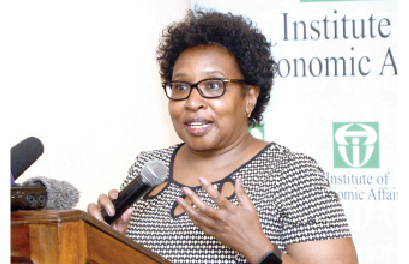Number of single women in public service increase
By Irene.Githinji and People.Reporter, April 12, 2023A gender audit of the 22 ministries showed a steady increase in the number of single women in the public service between 2010 and 2020.
Kenyatta University Women’s Economic Empowerment (WEE) hub Project Leader, Dr Regina Mwatha said a trend analysis for the 10 years shows that percentage of women who remained single steadily increased from 49.6 per cent in 2010 to 63.7 per cent in 2020.
She said the findings of the WEE hub audit raised questions on whether a majority of women sacrifice family and care for career progression.
“We suspect that sometimes, women who enter employment and want to grow a career may delay marriage, so at middle level they get promoted and are still not married because they are choosing career over care work… you know marriage comes with care work,” said Mwatha.
Mwatha made the remarks yesterday in an Institute of Economic Affairs (IEA) and Kenya Editors’ Guild forum in a Nairobi hotel, even as she stated that they are still finalising the report.
She said the gender audit of the 22 ministries was undertaken to analyse the two thirds status in public service between 2010 and 2020, from the time the Constitution was promulgated.
“We were evaluating whether the gender policy is being implemented as required. The proportion of women declined between 2010 and 2020,” she said.
According to Mwatha, the proportion of women in the public service declined by the year 2020, with statistics showing that women comprised 24.01 per cent while men were 75.99 per cent.
She said that the audit also revealed that women with first degrees increased from 27 per cent in 2010 to 45 per cent in 2020 while the proportion of men with a first degree in the same cadres declined from 64 per cent in 2010 to 46 per cent in 2020.
Despite the change, Mwatha said that more men than women were promoted within this period.
Similarly, she said women with a Master’s degree increased from 2.5 per cent to 4.4 per cent in 2020 while men with the same degree declined from 7 per cent in 2010 to 5 per cent in 2020.
She said the proportion of women at the management entry cadre reveals a steady drop in their representation between 2010 and 2020.
In 2010, the representation of women was highest at 41.7 per cent while men’s representation stood at 58.3 per cent.
There was a steady drop of women to 29.5 per cent in 2014 and a steady increase of men to 70.48 per cent in the same year.
By 2020, men comprised 68.66 per cent and women remained at 31.34 per cent.
Similarly, representation by gender in middle management job Group M-P shows a slight increase from 27 per cent of women to 34 per cent which means that men remained at the higher proportion of 66 per cent.
For the upper management level of job Group Q to V, the number of women increased from 23 per cent to 29 per cent in the 10 years period while that of men reduced from 77 per cent in 2010 to 71 per cent in 2020.
On gender responsive budgeting, she said the preliminary findings show that only eight ministries have initiatives that are sensitive to Women Economic Empowerment Initiatives (WEEI).
“The National Gender and Equality Commission, Department for Social Protection and for Gender are among the eight state departments that are the most WEE-sensitive ministries, as they have 100 per cent of their budgets dedicated to WEEI related services,” said Mwatha.
To realize gender issues mainstreaming at both levels of governance, she said advocacy should go beyond the eight-state department to all government ministries.
The audit also revealed implicit bias in policy, with Mwatha saying the audit revealed there is comprehensive general economic policy and law but minimal implementation
“Public perception of gender responsive budgeting is that women empowerment initiatives are seen as synonym to gender responsive budgets or feminism. Lack of gender disaggregated data as a limitation towards assessing the impact of the various women economic empowerment initiatives was also identified,” she said.
The audit also showed that a majority (90.6 per cent) took time off their daily routines to seek help in cases of Sexual and Gender Based Violence (SGBV) and they lose working hours during the experience.
Survivors said they suffered physical, emotional, economic, sexual and social violence, with husbands and boyfriends identified as the primary perpetrators.
Majority (96.9 per cent) of the survivors sought psychological counseling, while 75 per cent and 46.9 per cent others sought medical and legal assistance respectively.
“The audit showed a strong correlation between gender based violence and economic disempowerment,” said Mwatha.
